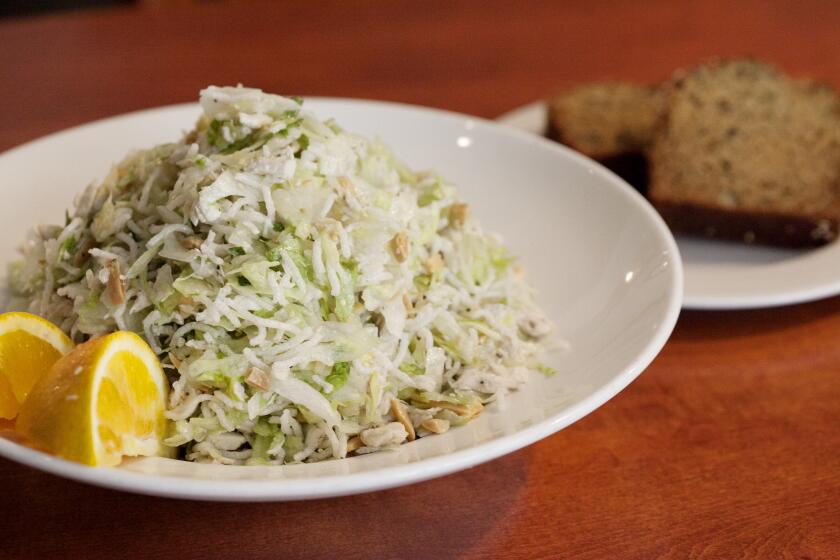Food writer Ruth Reichl on Jonathan Gold: He gave us the keys to a hidden city
Jonathan Gold was the most maddening person I’ve ever met.
Ask anyone.
His friends all knew that when he called you, 20 minutes after he’d promised to join you for dinner — at a restaurant or your house — to say he’d hit terrible traffic, it probably meant he hadn’t even gotten into his car. He was always late.
If you were his editor you gave him fake deadlines, hoping that if you could convince him that you needed it before you actually did, you might get the copy on time. Good luck. To Jonathan, deadlines were merely a suggestion.
Jonathan reveled in flouting the rules. In the ’80s, when I first met him, he cheerfully drove around without a driver’s license. He wore what he wanted — in the early years his constant costume was a slightly too small black motorcycle jacket — lived where he wanted, and spent his time indulging in the pursuits that interested him. Those included music of all kinds, a voracious appetite for books, and a deep interest in art of the weirdest sort. (If you haven’t heard the chicken story, ask me some time.)
For someone like me, who’s always been a very good girl, the fact that he spent his life doing exactly what he wanted — instead of what was expected — could be extremely irritating. But just when you were ready to explode he’d write something so wonderful, or do something so endearing, that you’d forgive him.
I met Jonathan right after I arrived in Los Angeles in 1984. On our first meeting he annoyed me by saying he’d eaten in every taco stand in the city, which struck me as an absurd bit of hyperbole. It turned out to be true. At the time he was employed as a music critic, and he’d casually drop names like Snoop Dogg and Dr. Dre, saying they were important musicians. How annoying when he turned out to be right about that.
But what we bonded over was food; I’d never met anybody with such deep knowledge of Korean and Thai cuisine, and he slowly initiated me into the mysteries of pupusas, arepas and tortas. He was a veritable encyclopedia of Los Angeles food, and when Laurie Ochoa (who became his wife) and I took over the Food section of this paper, the first thing we did was ask Jonathan to write for us. His copy, of course, was always late.
“I know it drives you crazy,” he said during one memorable argument, “but I’m worth it.” And of course, he was. In fact, the first thing I said when Conde Nast asked me to become the editor of Gourmet Magazine was, “can I bring Laurie and Jonathan with me?” Because although I knew Jonathan was going to be impossible, I couldn’t imagine trying to make the best epicurean publication in the country without their help.
Now, looking back, it seems to me that much as I respected Jonathan, I never really appreciated how much he gave us — or how much he changed food journalism. Long before anyone had used the words “social gastronomy,” long before Tony Bourdain stepped out of the kitchen and onto the television screen, at a time when nobody in America — and few people in the world — understood the power of food, Jonathan got it.
From the very beginning he used restaurant criticism as a way to talk about more than where you should eat. He understood, in his bones, the many ways that food is a powerful way to create community.
When I first arrived in L.A. a Thai chef told me that he could live his whole life in this city without learning English simply by staying inside the boundaries of the Thai community. He presented this as a sad thing, but what Jonathan understood is that it is precisely this insular quality that makes Los Angeles food so compelling. This is the one place in America where chefs from all over the world are cooking for a discerning audience of their own people.
But Jonathan didn’t want us to go out to Monterey Park simply to eat Sichuan pickles. He didn’t lure us out to El Monte or the world’s best birria burritos for their mere deliciousness. He wrote enticing prose designed to take us out of our safe little territories to mingle with other people because he knew that restaurants aren’t really about food. They’re about people.
He gave us the keys to a hidden city, introduced us to folks we’d never have known. And the city changed. It is nothing like the city I found when I first came here in 1984.
But he did it his way. Other food critics hire baby-sitters and leave their children at home. Not Jonathan. When he had a family, he wanted them with him wherever he went, and as a result Izzy and Leon have eaten more arcane food in more unusual places than any other kids on earth. I don’t think I’ve ever met better parents than Jonathan and Laurie — that family has been such a tight unit. It’s been awe-inspiring and pure pleasure to watch.
Selfishly I lament Jonathan’s loss because I want to read all those stories he’ll never write. And I’m sorry for the city because L.A. without Jonathan just won’t be the same. But it’s when I think of the Ochoa-Gold family as three instead of four that my heart really breaks.
Ruth Reichl was a food critic and food editor at the Los Angeles Times from 1984 to 1993.
More to Read
Eat your way across L.A.
Get our weekly Tasting Notes newsletter for reviews, news and more.
You may occasionally receive promotional content from the Los Angeles Times.










